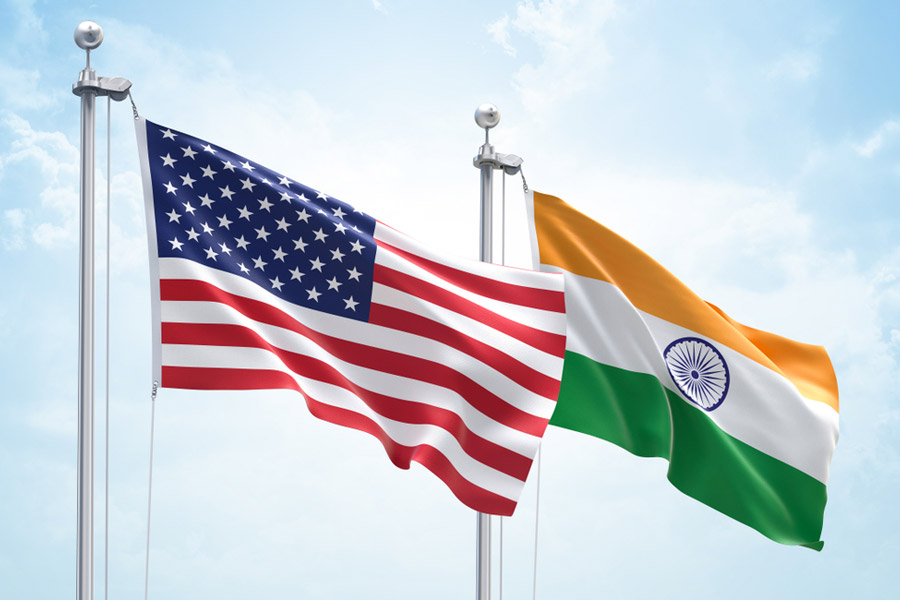As the campaign for the UK general election gathers momentum after British Prime Minister Rishi Sunak surprised many this week with a snap summer poll on July 4, exactly a month after India’s election results on June 4, the prospect of an India-UK free trade agreement (FTA) has been kicked into the long grass.
While political analysts and strategic experts have expressed confidence that very little should change on the bilateral relationship front whatever the outcome in either election, the very small window that was open for a deal being clinched by the Sunak-led Tory government has now been swept away in the election wave of both countries.
The Opposition Labour Party, in the lead in most pre-election surveys, has committed itself to “finish the job” but the timelines will remain uncertain for some time.
“Rishi Sunak’s shock poll date announcement of July 4 has skewered any prospect of the finalisation of the long-awaited and much-anticipated FTA with India by a Conservative government,” said Rahul Roy-Chaudhury, Senior Fellow for South and Central Asian Defence, Strategy and Diplomacy at the London-based think tank International Institute for Strategic Studies (IISS).
“The Labour Party, widely expected to form the next government in the UK, has maintained steadfast support for such a deal, subject to an examination of the 'fine print' once it comes into office. The prospect for such a trade deal appears positive, providing an early boost to relations between the two new governments – the Labour and the widely expected third Modi government,” he said.
Dr Chietigj Bajpaee, Senior Research Fellow for South Asia, Asia-Pacific Programme at Chatham House, described the FTA as a “key watchpoint” for its broader strategic significance in terms of deepening the bilateral relationship.
“There should be a high degree of continuity in UK-India relations, irrespective of who wins the UK election. Under Keir Starmer’s leadership, the Labour Party has tried to reset relations with India, which had deteriorated under [former leader] Jeremy Corbyn,” said Bajpaee.
“The UK’s outreach to India also needs to be seen in the broader context of the UK’s Indo-Pacific pivot. There are questions on the UK’s ability to sustain this in the context of fiscal constraints and preoccupation with other foreign policy priorities – wars in Ukraine and Gaza, and reviving relations with the EU,” he said.
A key aspect of this UK election will be that the country’s first Indian-origin Prime Minister, who took over in the wake of political turmoil within the governing Conservative Party in October 2022, will now be taking his record at Downing Street to the voters.
The British Future think tank has already forecast that the next UK Parliament is set to be the most diverse yet based on candidate selections by the major political parties, with at least 10 more MPs of ethnic minority background being elected to the House of Commons.
“While Labour is doing well overall in the polls, it's got more challenges with ethnic minority voters as it faces challenges with Muslim voters over Gaza and Palestine,” said Sunder Katwala, Director of British Future.
“For the Conservative Party, obviously, they have Rishi Sunak – a British Indian leader – for the first time. It's an unknown factor how much it will matter to British Indian voters that the leader of the party is from their background. The likelihood is it will be a source of some pride, especially among older voters, but it's unlikely to help with first time and younger voters who take diversity in politics more for granted and are in an age where the Conservatives are struggling badly,” he reflected.
The British Indian think tank, 1928 Institute, feels the British Indian vote is “very much to play for, with the Conservatives very marginally ahead of Labour”.
“Our opinion is that this earlier than anticipated election will slightly benefit the Conservatives as the Labour electoral machine is still to reach and resonate with parts of the Indian diaspora,” it said.
A summer rather than the expected autumn general election is viewed as a welcome move for ending a long period of uncertainty from a business and industry perspective.
“The new government will have many challenges to face, so we hope for a clear and decisive outcome that will allow the administration to implement its strategy to put the UK on the path of economic growth and prosperity,” said Hinduja Group Chairman G.P. Hinduja.
Except for the headline, this story has not been edited by The Telegraph Online staff and has been published from a syndicated feed.











